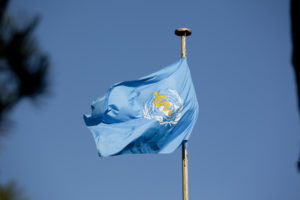
Accra, Ghana// — The recent inter-ethnic conflict in Ghana’s Savannah Region left families displaced, homes destroyed, and public services stretched to the limit.
Among the hardest hit are the districts of Sawla-Tuna-Kalba and Bole, where the surge in injuries, trauma, and displacement has put an extraordinary strain on local health facilities.
Clinics and hospitals, already operating with limited resources, are now struggling to cope with the sudden increase in demand for essential medicines, basic supplies, and emergency care.
During humanitarian crises, health systems often become one of the most vulnerable sectors. Shortage of medicines, disruption of supply chains, and overburdened facilities can quickly translate into avoidable loss of lives—especially for children, pregnant women, and those with chronic illnesses who require uninterrupted treatment.
To help address this urgent need, the World Health Organisation (WHO) has donated emergency medical supplies and consumables to the affected communities. The package includes essential medicines, medical consumables, and basic supplies intended to sustain both routine and emergency health services in the crisis-affected areas.
Speaking during the handover ceremony, Dr Fiona Braka, WHO Country Representative to Ghana, reaffirmed the organisation’s commitment to standing with affected populations.
“We are concerned about the impact of the crisis on essential services, including health care. These supplies are intended to bridge immediate gaps in service delivery, reduce suffering, and prevent avoidable loss of life”, she said.
The items were officially handed over to the Ghana Health Service (GHS) through the National Disaster Management Organisation (NADMO), the lead agency coordinating the humanitarian response. The collaboration highlights the importance of inter-agency cooperation during emergencies, where speed and coordination often make the difference in saving lives.
Receiving the donation, NADMO Director-General, Major (Rtd) Dr. Joseph Bikanyi Kuyon, expressed gratitude for WHO’s timely intervention.
“Health is often one of the first casualties in emergencies. These supplies from WHO will provide immediate relief and ensure that health facilities in the most affected districts can continue serving their people”, he noted.
He further stressed the importance of continued support from partners and stakeholders to sustain relief efforts in the region until stability is fully restored.
The donation comes at a critical time when many families are in need of health, shelter, and food assistance. For health workers on the frontlines, the additional medicines and supplies represent not just equipment, but a lifeline that enables them to continue saving lives under challenging conditions.
WHO reiterated its long-term commitment to strengthening Ghana’s health system resilience—ensuring that in times of peace or crisis, communities have equitable access to the care they need.


